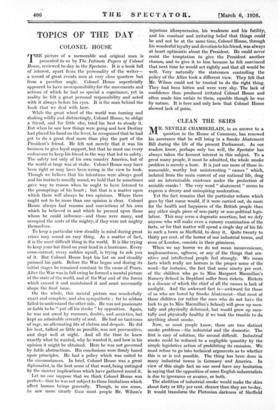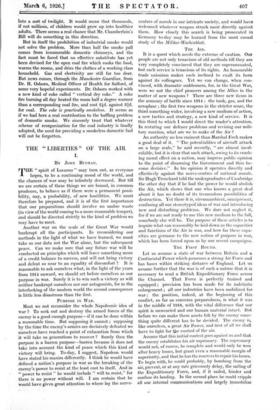CLEAN THE SKIES
MR. NEVILLE CHAMBERLAIN, in an answer to a question in the House of Commons, has renewed his assurance that he will bring in a Smoke Abatement Bill during the life of the present Parliament. As our readers know, perhaps only too well, the Spectator has always taken the keenest interest in this subject. To a great many people, it must be admitted, the whole smoke problem is merely a bore. It is just one more of those in- numerable, worthy but uninteresting " causes " which, isolated from the main current of our national life, drag out an interminable existence under the protection of amiable cranks ! The very word " abatement " seems to express a dreary and uninspiring moderation.
Yet the fact remains that the particular reform which goes by that name would, if it were carried out, do more for the health and happiness of the British people than any other single piece of non-party or non-political legis- lation. This may seem a dogmatic assertion, but we defy anyone who will make even a cursory examination of the facts, or for that matter will spend a single day of his life in such a town as Sheffield, to deny it. Quite twenty to thirty per cent. of the horror of our industrial towns, and even of London, consists in their griminess.
When we say horror we do not mean inconvenience, unpleasantness, ugliness, or any of the things that sen- sitive and intellectual people feel strongly. We mean facts which really are horrors in the proper sense of the word—for instance, the fict that some ninety per cent. of the children who go to Miss Margaret Macmillan's Nursery School in Deptford suffer from rickets. Rickets is a disease of which the chief of all the causes is lack of sunlight. And the awkward fact is—awkward for those of us who are bored by Smoke Abatement—that most of those children (or rather the ones who do not have the luck to go to Miss Macmillan's School) will grow up men- tally and physically deformed, but would grow up men- tally and physically healthy if we took the trouble to do anything about smoke.
Now, as most people know, there are two distinct smoke problems—the industrial and the domestic. The first is easy of sorution, the second difficult. Industrial smoke could be reduced to a negligible "quantity by the simple legislative action of prohibiting its emission. We must refuse to go' into technical arguments as to whether this is or is not possible. The thing has been done in many industrial towns in Germany and America. In view of this single fact no one need have any hesitation in saying that the opposition of some English industrialists is due to ignorance or avarice, or both.
The abolition of industrial smoke would make the skies about forty or fifty per cent. cleaner than they are to-day. It would transform the Plutonian darkness of Sheffield Into a sort of twilight. It would mean that thousands, if not millions' , of children would- grow up -into healthier adults. There seems a real chance that Mr. Chamberlain's Bill will do something in this direction.
But in itself the prohibition of industrial smoke would not solve the problem. More than half the smoke pall comes from innumerable domestic chimneys, and the fact must be faced that no effective-substitute has yet been devised for the open coal fire which cooks the food, warms the rooms, and dries the clothes of a working class household. Gas and electricity are still far too dear. But news comes, through the Manchester Guardian, from Dr. H. Osborn, Medical Officer of Health for Salford, of some very hopeful experiments. Dr. Osborn worked with a new kind of coke called " vertical dry coke." A coke fire burning all day heated the room half a degree warmer than a corresponding coal fire, and cost 21d. against 31d. for coal. The coke is practically smokeless. It seems as if we had here a real contribution to the baffling problem of domestic smoke. We sincerely trust that whatever scheme of reorganization for the coal industry is finally adopted, the need for providing a smokeless domestic fuel will not be forgotten.







































































 Previous page
Previous page